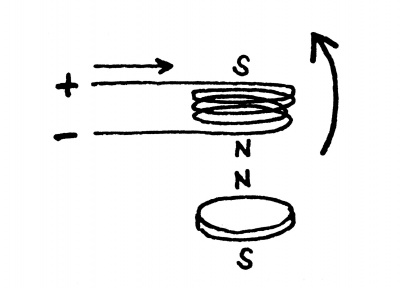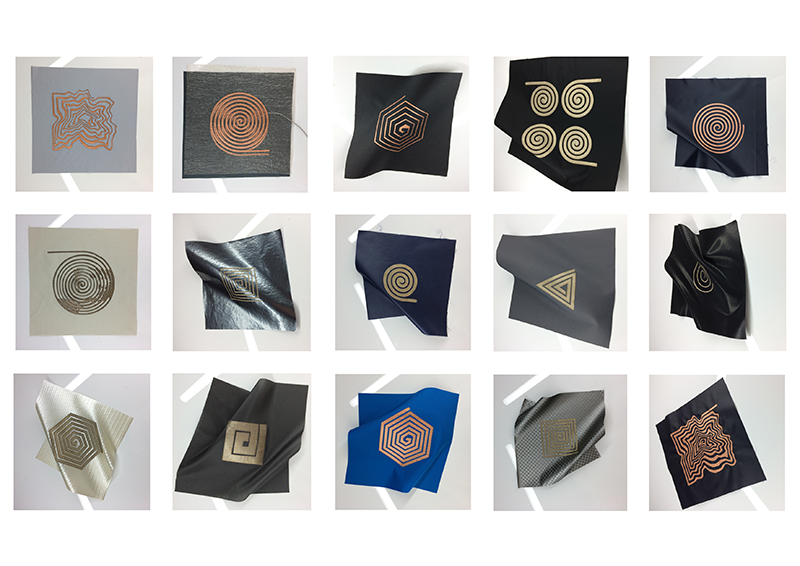Difference between revisions of "Textile Actuators"
| Line 28: | Line 28: | ||
sewing needle, pinking shears, scissors, soldering iron, tweezers, cutter knife, 7mm diameter shaft (end of pen or round tool) | sewing needle, pinking shears, scissors, soldering iron, tweezers, cutter knife, 7mm diameter shaft (end of pen or round tool) | ||
| − | '''[[https://www.kobakant.at/DIY/?p=5900 |Step-by-Step Instructions]]''' | + | |
| + | '''Follow the [[https://www.kobakant.at/DIY/?p=5900 |Step-by-Step Instructions]]''' | ||
==2. Fabric Speaker== | ==2. Fabric Speaker== | ||
Revision as of 16:44, 25 March 2020
Electromagnetic Coil
1. Flapping Wings
{{#ev:youtube|https://www.youtube.com/watch?time_continue=2&v=jrPeOXibGUk&feature=emb_logo}} 
This video demonstrates how the combination of an electromagnetic coil and a permanent magnet can be used to create a “flapping” movement……
How it works:
Electromagnetic coils are made of enameled wire coated with a very thin layer of insulation.
When the current flowing through the coil, it generates an electromagnetic field.
In this case, either attracts or repels a permanent magnet to create movements.
Changing the direction of the turns of a coil and the polarity of the DC power source can change the polarity of the magnet.
How to make it:
you will need:
Materials:
cotton fabric, silk fabric, cotton thread, neodymium magnet (1cm diameter, 2mm high, axially magnetized), enameled copper wire (0.01mm diameter), copper tape, solder
Tools:
sewing needle, pinking shears, scissors, soldering iron, tweezers, cutter knife, 7mm diameter shaft (end of pen or round tool)
Follow the [|Step-by-Step Instructions]
2. Fabric Speaker
SOFT SOUND:
Embroidered Fabric Speaker Step by step guide:
https://www.instructables.com/id/Embroidered-Fabric-Speaker/
{{#ev:youtube|https://www.youtube.com/watch?time_continue=2&v=sJDrZaG-K2M&feature=emb_logo}}
{{#ev:vimeo|https://vimeo.com/107454046}}
Nitinol Wire
1. Musle wire
2. Memory Wire
{{#ev:youtube|https://www.youtube.com/watch?v=F8L_etiBGMc&feature=emb_rel_end}}
Nitinol and Felt (test 4): the "jellyfish"
{{#ev:youtube|https://www.youtube.com/watch?v=MGMH-R7s2oM}}
The wire was pre-annealed to be plastic. Raw Nitinol is usually superelastic.
If you want shape memory wire then you must anneal the raw wire for 15 minutes by 500°C.
Then it lose its superelasticity and becomes shape memory wire.
{{#ev:vimeo|https://vimeo.com/33861667}}
Flexinol wire system
Muscle wire, also known as flexinol was the particular smart material that was chosen to be investigated for this project.
Flexinol is a shape memory alloy actuator wire. Made of nickel-titanium these small diameter wires contract (typically 2% to 5% of their length) like muscles when electrically driven or heated.
Although, the contraction might seem small, it is accompanied by such force that it can easily be applied through levers and linkages to achieve much larger movements.
{{#ev:youtube|https://www.youtube.com/watch?v=DW4WaTmoZ3c}}
{{#ev:youtube|https://www.youtube.com/watch?time_continue=1&v=4JQl8_D-370&feature=emb_logo}}
